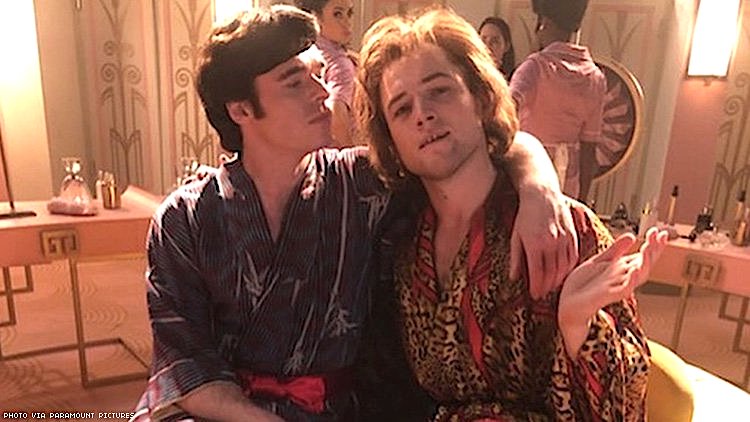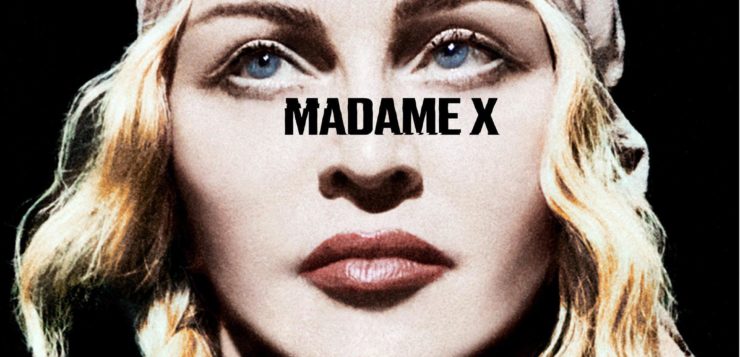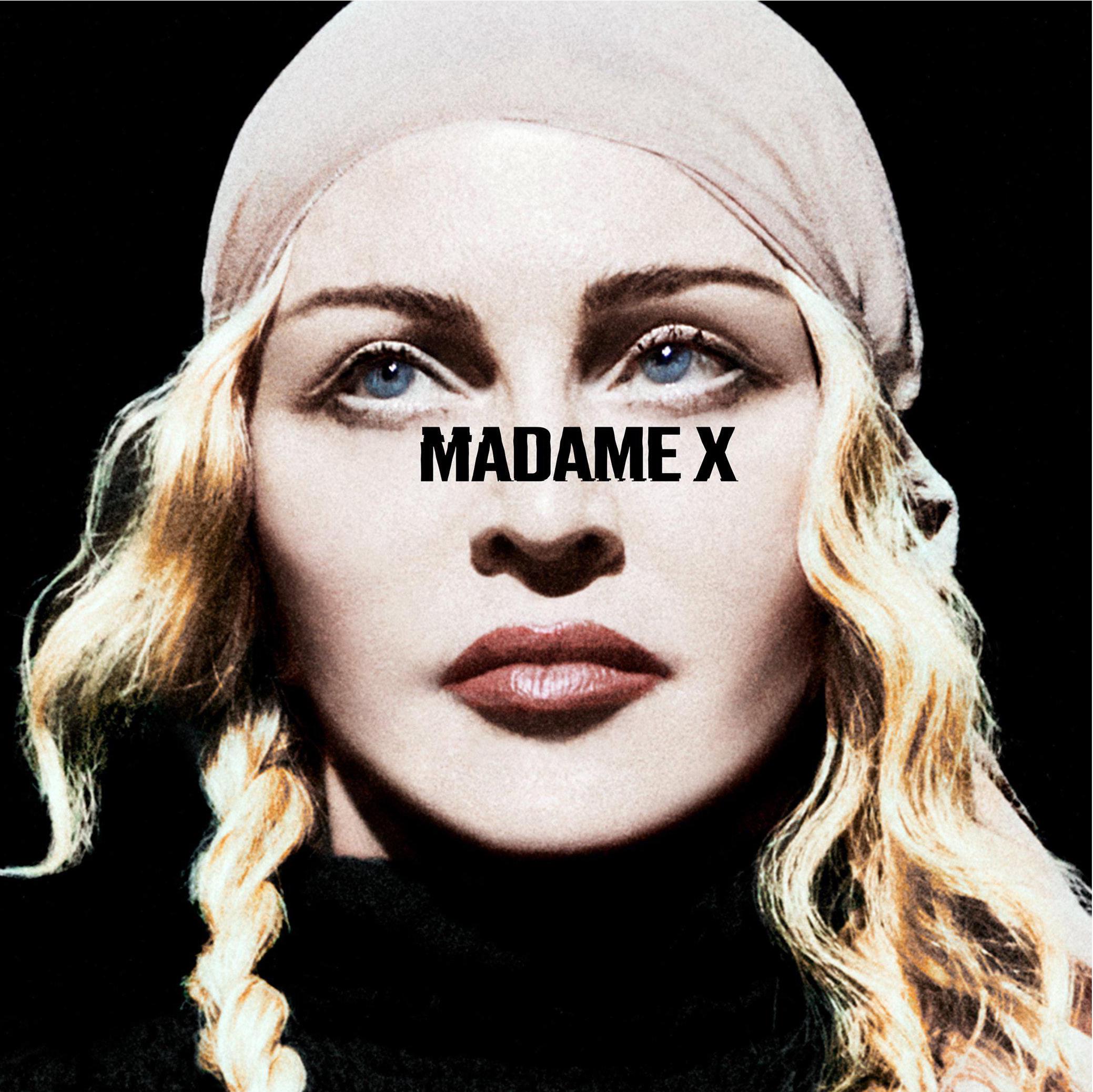IT’S HARD TO SAY which hit maker, Elton John or Madonna, had a better summer. The former is the subject of a riveting new biopic, Rocketman, the latter the creator of an ambitious new LP, Madame X—both tributes to the creativity and staying power of their subjects.
Like Elton John himself, Rocketman knows how to make an entrance: in the lead role, Taron Egerton (of Kingsman fame) arrives at his first AA meeting in a tangerine jumpsuit, centaur horns, and John’s trademark eyeglasses. Costume designer Julian Day is responsible for the 85-plus wardrobe changes. The film flashes back to John’s early life as Reginald Dwight in the dreary postwar suburbs of London. The chorus number that ensues makes plain that director Dexter Fletcher has taken inspiration from director Baz Luhrmann (Moulin Rouge!) and The Wizard of Oz, only Rocketman reverses things by going from a Technicolor world to a black-and-white childhood. The abruptness of this shift establishes that the narrative mode will be a magic carpet ride of sorts: bumpy and bright.
The Dwight parents include Reggie’s emotionally withholding father (Steven Mackintosh) and his fun-loving but self-centered mum (Bryce Dallas Howard). Reggie discovers the latter in flagrante delicto, kissing her boyfriend (and his future stepfather) in a parked car. It is Reggie’s grandmother Ivy (Gemma Jones) who provides support and guidance when the fourteen-year-old musical prodigy wins a scholarship to the Royal Academy of Music. She later tells her homesick grandson and piano prodigy: “There’s no going home. This is your life.”
Rocketman has inevitably drawn comparison with last year’s Bohemian Rhapsody, a biopic about Freddie Mercury, but the former is far less formulaic. There are touches of surrealism that keep the audience off balance. At a glam party in his baroque mansion, Elton John takes a handful of pills and stumbles off a diving board and into the swimming pool, where he has a vision of himself as a boy playing the piano underwater. It’s an ingenious sequence in which hitting rock bottom means ascending like an Avenger superhero to the top of the Statue of Liberty. Fireworks light up the sky.

In the absence of a romantic love story, the friendship between John and lyricist Bernie Taupin forms the film’s emotional backbone, not to mention a collaboration of epic productivity. Jamie Bell (Billy Elliot, now all grown-up) plays Taupin with sensitivity, especially when he rebuffs Elton’s attempt to kiss him. When the friends attend a party hosted by Mama Cass in the Hollywood Hills, Bernie wants to shield Elton from the unwanted advances of his female fans. But he also wants to capitalize on the fruits of the duo’s newfound fame: sexy supermodels with bedroom eyes. You’re a “shit-hot piano player,” Bernie tells Elton, and looks on as the rock star self-destructs. As Elton’s addictions to vodka, cocaine, sex, and shopping worsen, Bernie never leaves his side. In a moving scene later on, he hand-delivers the lyrics to what would become “I’m Still Standing.” With this, he affirms his friend’s power to affirm himself and, sure enough, the anthem becomes a roadmap to recovery.
Numerous studios passed on Rocketman for being “too druggy” or “too gay.” Not Paramount Pictures, which was bracing itself for a crash landing. Yet Rocketman crossed the $70 million mark within a month of its May release and in spite of the sex scene between Elton and his manager John Reid (played by Richard Madden), to whom he lost his virginity at the age of 23. It was important to John that the film not shy away from their joyous first encounter between the sheets. “I’m so glad it’s in there because I’m a gay man,” he told the Irish Mirror, and “when [Reid] is lying in my arms and I’m sitting back with a smile, I’m thinking ‘Ah, I’m normal, I’ve had sex.’”
The script by Lee Hall (John’s collaborator on Billy Elliot the Musical) draws a facile linkage between John’s unloving parents and his later addictions as revealed by flashbacks to his childhood during the AA meeting, to which we periodically return. Notwithstanding this Freudian throwback, Rocketman is a thrill ride all the way.
Like Sir Elton, the Material Girl is a showgirl at heart, and no less familiar with rapid outfit changes. Her latest look involves an eye patch, a black veil, and a Sergeant Pepper jacket. On Madame X, she declares “I will be gay” if gay people are “burned” before identifying with other victims of discrimination: Muslims, Africans, women, and the poor.
This is the musical complement to her acceptance speech at this year’s glaad Media Awards, where she marked the fiftieth anniversary of the Stonewall Riots, which “sparked a revolution and outcry of activism” in order for Americans to “stand up for love and against brutality and violence and hatred.” She went on to recall Christopher Flynn, her high school ballet teacher and the “first gay person I ever met,” who took a teenage Madonna to her first gay bar in Detroit. Her memories of the AIDS epidemic, which would later claim Flynn’s life, darkened her speech considerably. She described the “plague that moved in, like a black cloud, over New York City and that, in a blink of an eye, took out all of my friends,” including Keith Haring.
Inspired by her move to Lisbon in 2017, the first track is “Medellín” (one of two duets with the Colombian rapper Maluma), which takes its name from Maluma’s birthplace. Ever since 1986’s “La Isla Bonita,” Madonna has actively courted fans in Latin America, and her work with Maluma certainly re-energizes that base. He returns on “Bitch I’m Loca”: “Bitch, I’m loca / Bésame la boca.” Much has been made of the mishmash of genres on Madame X—trap, reggaeton, Portuguese fado, Brazilian funk—and while it’s true that this is Madonna’s first foray into “world music,” what she really does is to take a blowtorch to the genre. Take “Dark Ballet,” which begins with the lyric “it’s a beautiful life” (over a sparse piano) before a jarring tempo change and the use (and abuse) of Auto-Tune. Stranger yet is the mumble-rap of “God Control,” the first of two dance-pop tracks, where she implores her listener to “wake up.” The second is “I Don’t Search I Find,” a trippy return to 2005’s “Confessions on a Dance Floor.” Lyrically, Madonna has always liked to offer personal guidance, and some of her exhortations have all of the weight of a fortune cookie: “life is a circle” and “we can light up the dark/ everyone has a spark.”
Of the two veterans, Madonna has always been more stridently political than Elton John, and on “Batuka” (powered by African tribal beats), she sings: “Get that old man/ put him in a jail/ where he can’t stop us/ where he can’t hurt us.” She’s probably referring to the squid-colored serpent currently occupying the Oval Office. Understatement has never been a requirement in a John or Madonna song, and both have built their colossal careers on bucking tradition while maintaining a shrewd sense of the musical marketplace.
Today the word “icon” is bandied about far too freely, but John and Madonna (age 72 and 61, respectively) are inarguably iconic; each is a walking compendium of hit songs. It’s difficult to imagine a wedding reception without “Your Song” for the slow dance and “Holiday” for the up-tempo part where your Aunt Connie gets messy. Neither is one of those, as John famously put it, “who can easily hide.” Madonna expresses the same sentiment on “Come Alive” (the catchiest of tracks): “Stand out/ No, I don’t wanna blend in/ Why you want me to?” By now, however, who would be crazy enough to ask such a thing?
Colin Carman, PhD, author ofThe Radical Ecology of the Shelleys (Routledge), is 2019’s residential fellow at the Jane Austen House, Library and Museum in Hampshire, England.







